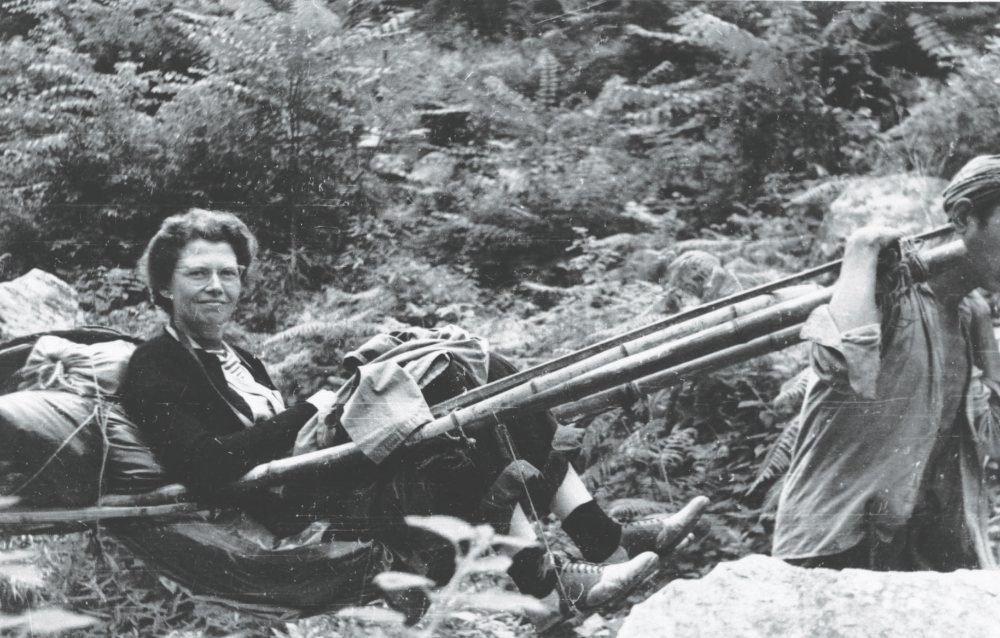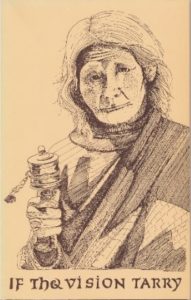
From early childhood I had an interest in missions, not centered on any particular field, but was challenged by stories of need in different places. After I had graduated from college and had begun teaching, my interest was revived. I applied to go to China and also to India under the Augustana Mission, but nothing came of it. During the years I spent in Minneapolis, first as a teacher at Minnehaha Academy and later at the Lutheran Colportage Service, I became acquainted with the World Mission Prayer League and often attended some of their meetings. Gradually my interest began to focus on Tibet and I remember vividly the night when God made my call to Tibet clear to me through the words of Matthew 28:19-20: “Go ye therefore and make disciples of all nations, baptizing them in the name of the Father, and the Son and the Holy Spirit: teaching them to observe all things that
I have commanded you: and lo, I am with you always even unto the end of the world.” “Go ye therefore” came to mean Tibet to me. I was so thankful that it was that clear, for through the many trials and disappointments that awaited us after we arrived on the field, the call was always clear and I knew that I was where the Lord wanted me to be.
To make a long story short, there were five of us who made up the China party in 1948. My companions were Mildred Hostad, Clarence and Helen Hjelmervik with their baby Lois, and Dorothy Christianson. On April 2, 1948, under the leadership of Paul Lindell, we sailed from San Francisco on the S.S. General Gordon to join Margaret Miller who had preceded us to Kangting, Sikang province in West China.
We had quite a trip. After arriving in Hongkong, we went to Canton where we spent several weeks at the Berlin Mission while Paul went ahead to Kangting to assess the situation. After he and Margaret returned, we went by train to Hankow, China, from where we traveled on the St. Paul, the Lutheran Federation plane that was carrying returning missionaries to various parts of China.
In Chengtu, in Szechwan province, we stayed at the China Inland Mission. From there we went by bus to Yaan where we stayed with Dr. and Mrs. Crook. The final lap of the journey to Kangting was made by whagan, a light hammock-like chair, carried by two carriers unless the person was especially heavy. The American army built a road on the route during World War II, but the years, the rain, the wear and tear and utter neglect had taken their toll and it was no longer usable for motor travel. It took us seven days to make this trip although in miles it was not so long. At night we stayed in Chinese inns, and went to sleep to and awakened with the sickly sweet smell of opium, since most of the carriers were opium smokers. Poor fellows, because of the heavy work, sickness and pain, most of them ended up as opium addicts.
 At one inn there were many carriers assembled for the night, and the men sat up gambling noisily. We could not sleep because only a wooden partition with a large opening in it separated us from the drinking, gambling crowd. At length, Dorothy, with the courage of inexperience, got up, took a large flash light, shone it into the room and ordered: “Go to bed. We want to sleep.” Instantly dead silence fell on the players and as one mass they arose and left the room.
At one inn there were many carriers assembled for the night, and the men sat up gambling noisily. We could not sleep because only a wooden partition with a large opening in it separated us from the drinking, gambling crowd. At length, Dorothy, with the courage of inexperience, got up, took a large flash light, shone it into the room and ordered: “Go to bed. We want to sleep.” Instantly dead silence fell on the players and as one mass they arose and left the room.
Nearly a year later Dorothy had to accompany a patient down country and stayed at this same inn. The woman innkeeper recalled this incident and remembered that it was Dorothy who had disbanded the all-night gamblers.
We were held up for two days at another inn because the road was completely demolished due to a land slide. A path had to be cut on the hillside above the inn. During the delay one of our party did some scouting of the area and discovered a robber’s hideout just above the inn. Fortunately we were not molested during this delay or along the path on the week-long journey into Kangting though the countryside was known to be infested with many robber bands.
Much could be written about the inns. They were dirty and ridden with fleas, lice and bed bugs. We had a generous supply of DDT which we spread around lavishly but this did not insure bug-free sleep or bug-free sleeping bags. Rats abounded and sleep was often disturbed by rats jumping onto the beds and being overly friendly.
Food was scarce on the road to Kangting. Frequently all that could be purchased was unleavened steamed bread and Chinese tea. The remains from tea cups could be slung onto the dirt floor… no disposal problem.
One time we were promised a big chicken feed; we needed it for our diet had been very meager for days. The fellow took off at great speed in search of the fowl, but he must have gone to Timbuktu for it was very late when he returned with the fowl in tow. With the exception of the men, the entire party had gone to bed… hungry. Eventually the fowl was cleaned and cooked and we rose to the occasion and enjoyed a tasty meal of rice and chicken. In that remote village it seemed a feast.